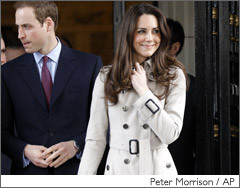Harvard Health Blog
Kate Middleton’s pre-royal weight loss: stress, “brideorexia,” or the Dukan Diet?

Talk about a big wedding.
In addition to the 1,900 guests in Westminster Abbey (assorted royals, governors-general, church leaders, and celebrities like Mr. and Mrs. David Beckham, Sir Elton John, and Guy Ritchie without his ex, Madonna), an estimated 2.5 billion people will be watching Friday morning when Prince William of Wales and “commoner” Catherine Middleton exchange vows.
One topic of royal wedding conversation has been Middleton’s weight and whether she has gotten too thin (too rich is an altogether different matter). According to one report in the British press that I read recently, she weighs 8 stone 8, or 120 pounds (a stone is 14 pounds). Many sources put her height at 5 feet 10 inches. If that weight and height are accurate (granted, a sizable if), then her body-mass index (BMI) is 17.2, which would put the 29-year-old princess-to-be in the underweight category. British newspapers have reported that Middleton has dropped two dress sizes since the engagement was announced in November.
There seem to be three prevailing theories about Middleton’s presumptive weight loss—and two may pertain to many brides (and perhaps a few grooms, too): stress, “brideorexia,” and a new diet.
1) Could it be stress?
The notion that stress could be causing Middleton to lose weight is plausible, though a great deal of research suggests that stress tends to move weight in the opposite direction.
One part of stress is the “fight or flight” response. It includes a surge in adrenaline-like hormones that suppress appetite. Fight-or-flight physiology may also discourage eating because it shunts blood away from the digestive system.
While acute stress may reduce food intake, chronic stress appears to increase it. Studies have shown a correlation between increased stress and excess weight. Stress increases the level of cortisol, a hormone secreted by the adrenal glands. A high level of cortisol has been associated with obesity. And there are some pretty convincing lines of evidence that suggest that high cortisol levels from stress increase the appetites for foods that are fatty and sweet.
Of course, we’re all different. Some people may respond to stress mainly with an appetite-suppressing fight-or-flight response, while others may have a cortisol-driven desire to calm down and eat.
2) Does she have “brideorexia”?
Another theory is that Middleton is trying (perhaps too hard) to lose weight for her wedding.
Who doesn’t want to look good for their wedding, royal or common—and these days, looking good almost always means looking thinner. It’s been noted that in many couples’ lives, no event is as photographed as their wedding. (This may be true for Will and Kate, although unlike the rest of us, they’ve a coronation to look forward to.)
I don’t know about the UK, but on this side of the pond people started turning the desire of brides to look good and lose weight into businesses several years ago. Now there are bridal boot camps, bridal workouts, bridal diet plans, and reality shows based on brides-to-be slimming down to get ready for the big day. The term “brideorexia” was coined to denote the most extreme (and frequently unhealthy) of these wedding-related weight-loss efforts.
Several years ago, a pair of Cornell University researchers reported findings of a study of weight and weddings in the journal Appetite. I spoke to one of them, Jeffrey Sobal, last week.
Their sample consisted of 272 bridal show registrants who filled out questionnaires about six months, on average, before their wedding day. In many ways, the results were just what you’d expect—and not all that alarming.
Most (70%) of the women wanted to lose a lot of weight (23 pounds, on average) and had lost only a fraction of that amount (8 pounds). But their goals were in a healthy range and their methods for reaching them were pretty reasonable: drinking lots of water, aerobic exercise, eating less food, and eating foods with fewer calories.
“I think brideorexia is hyperbole,” Sobal told me. “We didn’t really see it.”
Still, about a quarter of the women in the study who wanted to lose weight did resort to at least one of what Sobal and his colleague, Lori A. Neighbors, termed “extreme behaviors,” such as smoking, taking diet pills, and skipping meals (skipping meals may not be wise but it hardly seems extreme). And 14% took the risky step of buying a wedding dress that was smaller than their current body size.
3) Does the Dukan Diet deserve the credit?
Rumors that Kate Middleton lost weight using a popular diet devised by Pierre Dukan, a French physician, aren’t true, says royal watcher Ingrid Seward. But talk about the Dukan Diet was enough to pique my curiosity, partly because low-carb, high-protein diets have actually fared pretty well in head-to-head studies of weight-loss diets.
I dipped into the English translation of the Dukan Diet that became available in American bookstores just last week.
Dr. Pierre Dukan uses a soupçon of science along with many of the tried-and-true techniques of diet books:
- a strict first phase that promises quick results (my yellowing copy of the Scarsdale diet promises that you’ll lose a pound a day during the first two-week phase)
- subsequent phases that are more liberal but are supposed to keep the weight off
- a mix of flexibility (don’t worry about calories) and rules (no bananas,grapes, or cherries during the consolidation phase)
Dukan recommends consuming 3 tablespoons of oat bran daily and eating only protein one day each week (he suggests Thursdays) for the rest of your life. There are also some charming French touches, such as steak tartare is okay during the initial, all-protein phase, but only if it is prepared without oil.
There is a significant difference between the Dukan, Atkins, and South Beach diets when it comes to fat. Dukan casts dietary fat as the “absolute enemy of anyone trying to be slim,” whereas the other two are more accepting of it.
But overall, you might say about the Dukan Diet plus ça change, plus c’est la même chose (the more things change, the more they stay the same).
About the Author

Peter Wehrwein, Contributor, Harvard Health
Disclaimer:
As a service to our readers, Harvard Health Publishing provides access to our library of archived content. Please note the date of last review or update on all articles.
No content on this site, regardless of date, should ever be used as a substitute for direct medical advice from your doctor or other qualified clinician.















